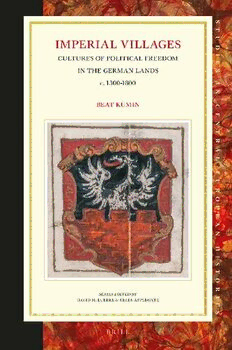
Imperial Villages: Cultures of Political Freedom in the German Lands, c. 1300-1800 PDF
Preview Imperial Villages: Cultures of Political Freedom in the German Lands, c. 1300-1800
Imperial Villages Studies in Central European Histories Founding Editors Thomas A. Brady and Roger Chickering Edited by David M. Luebke (University of Oregon) Celia Applegate (Vanderbilt University) Editorial Board Steven Beller (Washington, D.C.) Marc R. Forster (Connecticut College) Atina Grossmann (Columbia University) Peter Hayes (Northwestern University) Susan Karant-Nunn (University of Arizona) Mary Lindemann (University of Miami) H.C. Erik Midelfort (University of Virginia) David Sabean (University of California, Los Angeles) Jonathan Sperber (University of Missouri) Jan de Vries (University of California, Berkeley) VOLUME 65 The titles published in this series are listed at brill.com/sceh Imperial Villages Cultures of Political Freedom in the German Lands c. 1300–1800 By Beat Kümin LEIDEN | BOSTON Cover illustration: Coat of arms featuring an eagle and crenellated wall granted to the imperial village of Gochsheim in a charter of 1568. Gemeindearchiv, GO-ZM25002-UI/1-(021). Reproduced with kind permission of the communal archivist. Library of Congress Cataloging-in-Publication Data Names: Kümin, Beat A., author. Title: Imperial villages : cultures of political freedom in the German lands, c. 1300–1800 / by Beat Kümin. Description: Leiden ; Boston : Brill, [2019] | Series: Studies in Central European histories, ISSN 1547-1217 ; volume 65 | Includes bibliographical references and index. Identifiers: LCCN 2019003839 (print) | LCCN 2019012878 (ebook) | ISBN 9789004396609 (E-book) | ISBN 9789004345065 (hardback : alk. paper) Subjects: LCSH: Holy Roman Empire—Administrative and political divisions. | Holy Roman Empire—Politics and government. | Central-local government relations—Holy Roman Empmire. | Decentralization in government— Holy Roman Empire. | Political culture—Holy Roman Empire. | Country life—Holy Roman Empire. Classification: LCC JN3249 (ebook) | LCC JN3249 .K95 2019 (print) | DDC 320.80943—dc23 LC record available at https://lccn.loc.gov/2019003839 Typeface for the Latin, Greek, and Cyrillic scripts: “Brill”. See and download: brill.com/brill-typeface. ISSN 1547-1217 ISBN 978-90-04-34506-5 (hardback) ISBN 978-90-04-39660-9 (e-book) Copyright 2019 by Koninklijke Brill NV, Leiden, The Netherlands. Koninklijke Brill NV incorporates the imprints Brill, Brill Hes & De Graaf, Brill Nijhoff, Brill Rodopi, Brill Sense, Hotei Publishing, mentis Verlag, Verlag Ferdinand Schöningh and Wilhelm Fink Verlag. All rights reserved. No part of this publication may be reproduced, translated, stored in a retrieval system, or transmitted in any form or by any means, electronic, mechanical, photocopying, recording or otherwise, without prior written permission from the publisher. Authorization to photocopy items for internal or personal use is granted by Koninklijke Brill NV provided that the appropriate fees are paid directly to The Copyright Clearance Center, 222 Rosewood Drive, Suite 910, Danvers, MA 01923, USA. Fees are subject to change. This book is printed on acid-free paper and produced in a sustainable manner. Dedicated to the Memory of Peter Blickle ∵ Contents Preface ix Notes on the Text x List of Figures and Acknowledgements xi Abbreviations xV Part 1 Approaches 1 Polities without a Prince: an Introduction 3 2 Origins, Evolutions and Settings 17 Part 2 Regimes 3 Domestic Affairs: Co-Operation and Conflict 49 4 External Relations: Protectors and Predators 83 5 Religious Life: Heaven and Earth 119 Part 3 Perspectives 6 Representations and Perceptions 157 7 Conclusions 199 Appendix 1: Communities Possessing, Claiming or Attributed Imperial Village Status (Pre-1803) 209 Appendix 2: Senior Officials and Clergymen in Five Imperial Villages c. 1300–1800 223 Bibliography 237 Index 266 Preface Looking for micro-laboratories of popular political and religious agency in pre- modern Europe, the parish republic of Gersau on Lake Lucerne soon emerged as an ideal starting-point. Archival work on its records was facilitated by a Small Research Grant from the British Academy (2011–13). A Senior Fellowship at the Alfried Krupp Wissenschaftskolleg in Greifswald (2012–13) then allowed a broadening of horizons to “free” villages throughout the Holy Roman Empire, while an invitation to serve as Guest Professor at the University of Konstanz in 2015 provided a congenial environment for conceptual reflection, a pro- cess also greatly advanced by the participants in two dedicated workshops at Gersau (in 2012 and 2014) as well as the audiences of conference/seminar pre- sentations at Aberdeen, Bielefeld, Göttingen, Greifswald, Konstanz, London, Los Angeles, Manchester, Odense, Oxford, Tübingen, Växjö and Vienna. I am indebted to all funding bodies, academic hosts, the University of Warwick (for a period of study leave to complete the typescript) and the copy- right holders (for granting permission to reproduce items from their holdings in this book). Particular thanks go to the District Council of Gersau (headed by Bezirksammann Adrian Nigg-Arnold) for its enthusiastic backing of nu- merous project-related initiatives – especially the year-long commemorative celebrations of “Gersau 1814–2014” – and several exceptionally helpful archi- vists: Marzell Camenzind (Gersau), Dr Roman Fischer/Corinna Herrmann (Frankfurt), Dr Elmar Geus/Walfried Hein (Gochsheim), Marc Nördinger (Bad Soden am Taunus) as well as the staff at the state archives of Lucerne, Schwyz, Wiesbaden, Würzburg and the research libraries of Greifswald, Konstanz and Oxford. Alongside, I would like to acknowledge the help of Michael Geisler (Schwalbach), Albert Müller (Zug) and Klaus Belzer/Joachim Siebenhaar (Geschichtsverein Reichsdorf Sulzbach) at various points during my research. Lukas Kümin ably assisted with the indexing. Finally, I am grateful to the co- editors of ‘Studies in Central European Histories’ for accepting the proposal and Wendel Scholma / Kim Fiona Plas at Brill Publishers for seeing it through to publication. This book is dedicated to the memory of Peter Blickle†, the inspiring aca- demic teacher and researcher who transformed local community studies.
